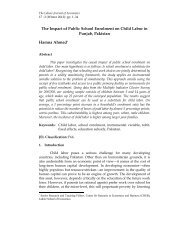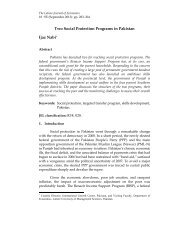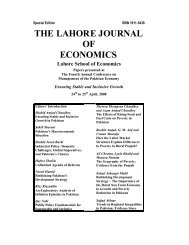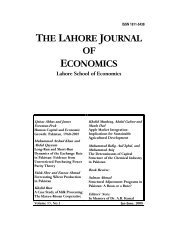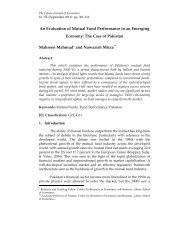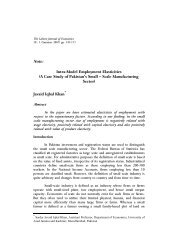Special Edition-07.pdf - Lahore School of Economics
Special Edition-07.pdf - Lahore School of Economics
Special Edition-07.pdf - Lahore School of Economics
Create successful ePaper yourself
Turn your PDF publications into a flip-book with our unique Google optimized e-Paper software.
68<br />
Shakil Faruqi<br />
Currently, the financial system in its structure, functions and policy<br />
regime that governs it is drastically different from what it was a decade ago.<br />
With deregulation <strong>of</strong> the financial regime, financial repression <strong>of</strong> the<br />
previous decades has receded though it has not been eliminated. Purely<br />
solvency concerns that dominated much <strong>of</strong> the 1990s have yielded to<br />
concerns <strong>of</strong> efficiency <strong>of</strong> financial intermediation and stability <strong>of</strong> the<br />
financial system in the background <strong>of</strong> a structural shift as well as operational<br />
shift discussed below.<br />
A Shift <strong>of</strong> Focus<br />
In this sense, the task <strong>of</strong> macro financial reforms is over, almost, but<br />
the task <strong>of</strong> financial system development is not over and this phase will be no<br />
less demanding than the previous phase. Therefore, now a shift is warranted<br />
to reforms and restructuring <strong>of</strong> sectoral or sub-sectoral finance which has to<br />
be activity based not institution based. Front line reforms have been the<br />
centre <strong>of</strong> attention <strong>of</strong> policy makers in the past. The focus now has to be on<br />
financial system development under the reformed policy regime and new rules<br />
<strong>of</strong> the game in an environment vastly different from what prevailed before.<br />
This shift in focus is also needed because Pakistan’s financial system has<br />
entered the post-reform era with all its potentials, complexities and<br />
challenges. How well the financial system performs in this era depends on how<br />
sustainable the financial regime is and how resilient it is in coping with<br />
change and financial shocks, both domestic and global; and how good and<br />
forward looking is the management <strong>of</strong> the financial system.<br />
There are two powerful implications concerning the functions and the<br />
operations <strong>of</strong> the financial system. One has to do with the efficiency <strong>of</strong><br />
transfer <strong>of</strong> financial resources between suppliers and users within the<br />
economy. How well this transfer occurs and on what terms and how efficiently<br />
it is performed by the financial system is <strong>of</strong> immense significance to everyone,<br />
be they households, large corporate or small and medium size businesses, or<br />
the government and its entities. The second set <strong>of</strong> implications concern a<br />
distorted distribution <strong>of</strong> resources between various segments <strong>of</strong> the society<br />
resulting from the operations <strong>of</strong> the financial system, thereby aggravating<br />
income distribution patterns that are already stacked against the poorer<br />
segments <strong>of</strong> the society. The mechanisms <strong>of</strong> resource transfer by themselves<br />
are not neutral to the social implications <strong>of</strong> the transfer.<br />
Challenges in the Post Reform Era – Stability and Solvency<br />
In managing the financial system during the post-reform era, the<br />
main challenge will be that <strong>of</strong> maintaining stability and sustaining high



